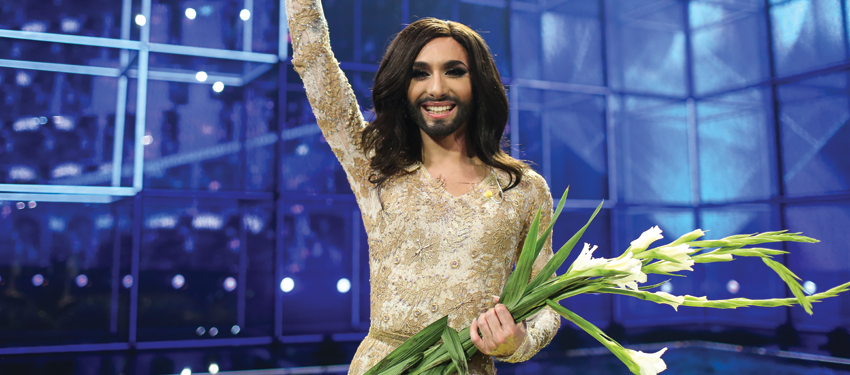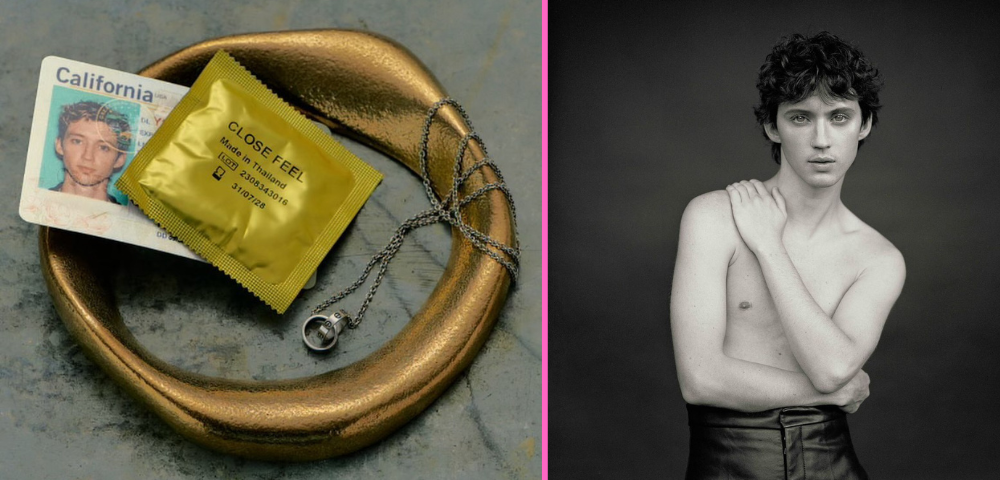
The Wurst of times

LET’S admit it, this year’s Eurovision Song Contest wasn’t really about songs.
Or licentious Polish washer women.
Or even Jessica Mauboy’s half-time attempt to make Australia part of the competition.
No, at it’s core, at it’s very essence, this year’s Eurovision was a referendum on facial hair.
Specifically, the age-old battle between moustaches and beards.
Finally, voters from Valencia to Vladivostok had the opportunity to choose.
France put up a valiant effort with numerically-challenged trio Twin Twin performing an ode to facial fur, one notable line being “I wanna have a moustache”.
Sadly, no one else wanted France’s moustache and, with just deux points, the nation achieved its lowest ever Eurovision score.
No, the night belonged to Austria and the beard.
Specifically, a beard on a man in the guise of a woman.
A look the UK’s New Statesman said was the most “genderqueer” the song contest had seen.
Rise Like a Phoenix, a power ballad so soaring and full of key changes it makes Bonnie Tyler sound like Angus and Julia Stone on a quiet, introspective kind of a day, propelled Conchita Wurst to the top spot.
“We are unity and we are unstoppable,” said Wurst upon winning, almost challenging Russian President Vladimir Putin to come and have a go if he thought he was hard enough.
Condemnation from the east was swift.
“There’s no limit to our outrage. It’s the end of Europe,” foamed Russian nationalist politician, Vladimir Zhirinovsky.
“Fifty years ago the Soviet army occupied Austria. We should have stayed,” he added, berating the country’s former communist leaders for a worrying lack of foresight when it came to the possibility of singing drag queens.
Putin himself duly chimed in, saying Wurst shouldn’t flaunt her sexuality and put herself “up for show.”
Meanwhile Serbia’s religious leaders declared that recent flooding in the Balkan states was God’s wrath at Wurst’s victory.
Wurst laughs off the criticism.
“To all those haters thank you for your attention, you clearly have a lot of time on your hands to spend thinking about little old me,” she tells UK’s Attitude magazine.

Using her dislike of US pop poppet turned enfant terrible Miley Cyrus as an analogy, Wurst suggests the vitriol is unwarranted: “I was just surprised that people would invest so much time in something they do not like.
“I do not like Miley Cyrus but I wouldn’t go on her Facebook page and post something nasty about her.
“I just won’t listen to her music.”
At Cyprus’ first pride march in May, Austria’s ambassador attended with a freshly painted beard to show his country’s solidarity with protesters.
In Moscow, women with Wurst-style beards were arrested after staging an illegal demonstration in the singer’s honour.
While elsewhere in Russia, men have been shaving their beards to show their rejection of Wurst.
Does Wurst see herself as a symbol for gay people in countries where rights are being repressed?
“I certainly don’t see myself as a role model, I am not perfect but I try to use what I have, the fame and attention to encourage tolerance and acceptance,” she says.
“The terrible laws in Russia are ridiculous and I hope I can do something to change the way people perceive gay men.”
Hailing from a village high in the Austrian Alps, Wurst’s creator Thomas Neuwirth found his childhood difficult: “Being in a small village I was forced to hide being gay and I changed myself in every way I could imagine so that I could lead a happy life.
“But then eventually I came to the conclusion that I deserved a fabulous life like everyone does and then came out.”
Back then, not many people were interested in Neuwirth’s ambition or his views on LGBTI rights.
Now, Wurst’s management tells the Star Observer that requests to perform and talk at major events number in the “thousands” each day.
Wurst has already begun to tread Europe’s gay circuit with appearances at legendary London club G-A-Y, and performances at pride festivals in Zurich and Dublin.
Flowers have arrived from Elton John, selfies have been taken with Vivienne Westwood, and cosy chats with Graham Norton have been had in front of a TV audience of millions.
Yet, perhaps more surprisingly, Wurst has also appeared at events not usually the domain of Eurovision winners.
At Vienna’s TEDx conference, Wurst talked about the continuing homophobia surrounding HIV and AIDS.
If someone dies of cancer, Wurst said, they are an “innocent victim, but if someone died of AIDS there was nothing innocent about that.
“No other disease still depends so much on the biography of the victim,” she said.
“That’s, unfortunately, what many people still think.”
Wurst’s message of placing love above hate might not be complex, but people are listening, and that’s more than most Eurovision winners have achieved.
However, what Wurst will do next is unclear.
A Grammy would be nice, she admits. And it might be easier than changing Putin’s position on gay rights.
Plus there is still that difficult second single to release to a world eager to see if Wurst’s phoenix can maintain its rise.
However, if nothing else, surely there might be a spot available at Sydney Mardi Gras next March?
Wurst is tight lipped about the possibility.
Despite this, her people tell the Star Observer that she is hoping her success will bring her to Australia: “Conchita would love that.”
**This article first appeared in the July edition of Star Observer. The August issue has just hit the stands in Melbourne, Sydney, Brisbane, Adelaide and Canberra. Click here to find out where you can grab your free copy.









